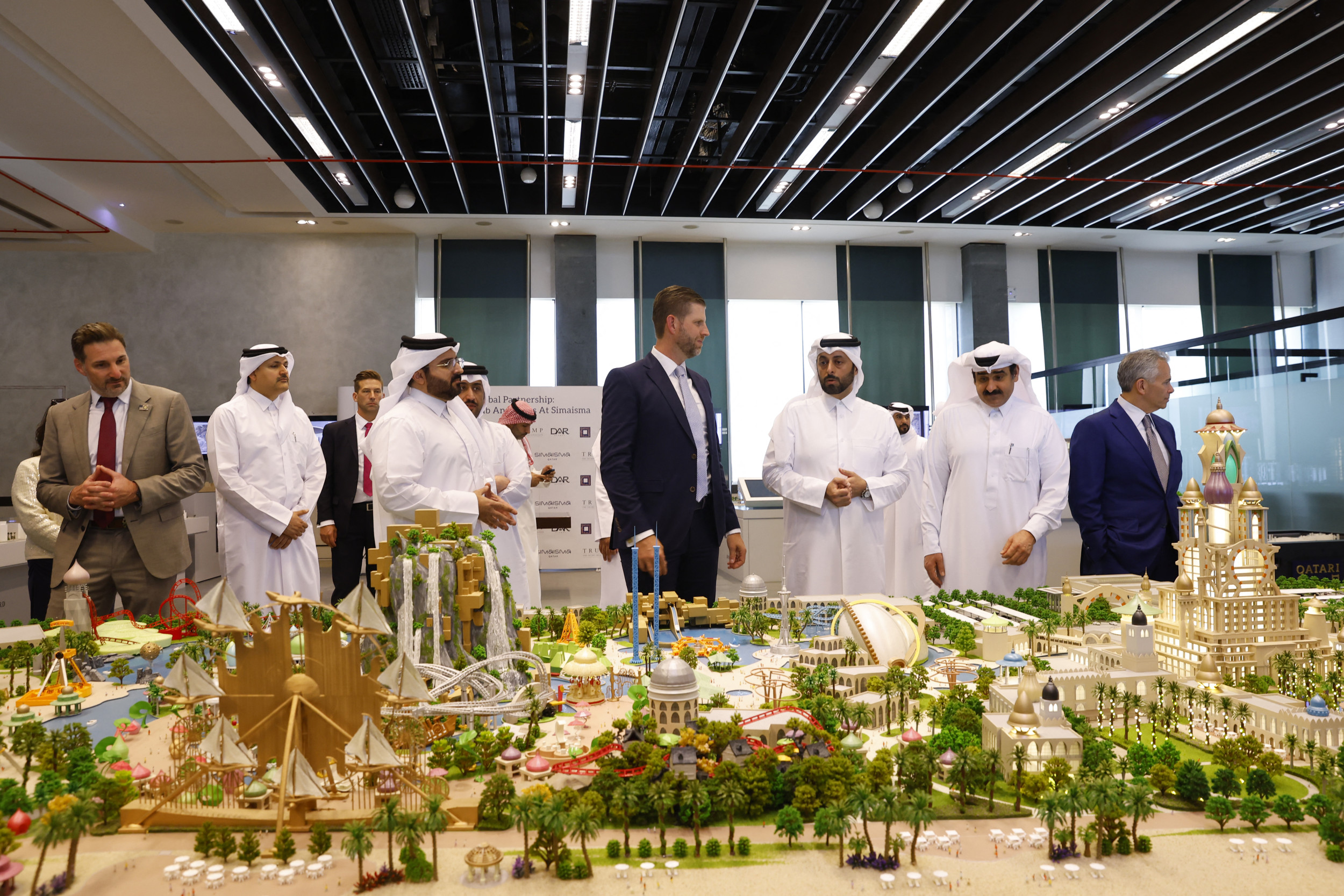
As President Donald Trump embarks on his first overseas trip since returning to office, Gulf nations are intensifying their diplomatic engagements, coupling high-level meetings with substantial investment commitments aimed at strengthening ties with Washington.
The president is schduled to visit Saudi Arabia, the United Arab Emirates and Qatar from May 13 to May 16.
Why It Matters
Trump is not only welcoming goodwill gestures—he’s also counting on them. His return to the Middle East comes with an agenda that aims at countering Chinese and Iranian influence.
By aligning Gulf investment with his ‘America First’ platform, Trump sees a chance to extract tangible benefits while promoting a U.S.-led, deal-driven approach to the Middle East, an effort that has also drawn scrutiny from critics at home over transparency and ties to his private business interests.
Arab partners are eager to deepen business ties and secure defense deals—but navigating the political minefield of Gaza and managing tensions with Israel remains a significant hurdle for Trump’s broader regional ambitions.
KARIM JAAFAR/AFP/Getty Images
Billions in U.S. Investments
A U.S.-Saudi investment forum is scheduled for May 13 in Riyadh, coinciding with President Trump’s visit. Senior Saudi officials and top U.S. executives—including BlackRock’s Larry Fink, Citigroup’s Jane Fraser, and Google‘s Ruth Porat—will discuss deals in energy, finance, tech, and infrastructure, according to Saudi government portal Daleel.
In March, Trump announced that Saudi Arabia would invest $1.3 trillion in plans that include purchases of American military equipment. This was in addition to $600 billion that the Saudi crown prince pledged to invest in the United States over the next four years. The United Arab Emirates has pledged to invest $1.4 trillion in the United States over the next 10 years, according to the White House.
Both Saudi Arabia and the UAE have demonstrated strong interest in artificial intelligence, launching multi-billion-dollar initiatives to invest in AI infrastructure, research, and global partnerships, with Trump signaling possible easing of U.S. chip export restrictions for select Gulf nations.
Qatar is set to announce up to $300 billion in deals, including a $2 billion drone purchase and a major aircraft order from Boeing, Axios reported, while Gulf airlines are expected to pledge nearly $3 trillion in major accords, according to the UAE-based Gulf News—far surpassing deals during Trump’s 2017 visit.
Meanwhile, Trump has accepted a luxury plane as a “gift” from Qatar’s royal family that will be used as Air Force One — drawing attacks from critics.
Trump’s Gulf Properties
The Trump family’s relationship with Gulf states is personal too. The Trump Organization has expanded its footprint in the Gulf, notably in Saudi Arabia and the UAE. In Saudi Arabia, it partnered with Dar Global to develop luxury residential towers in Riyadh and Jeddah. In the UAE, the company operates the Trump International Golf Club in Dubai and has announced plans for a new Trump-branded tower.
These ventures have raised concerns from Trump critics about potential conflicts of interest, especially given the intertwining of business and politics in the region. Critics argue that such entanglements could influence U.S. foreign policy decisions, underscoring the need for transparency and ethical considerations.
Reviving the Abraham Accords?
Normalizing ties with Israel has long been a U.S. priority, but Trump has shown renewed urgency in pushing the effort, suggesting more Arab nations could join the Abraham Accords he established during his first term. Just a day before his scheduled trip, Trump struck a quiet understanding with Hamas on the release of an American-Israeli hostage—raising hopes of renewed momentum toward a broader Gaza resolution.
Saudi Arabia has so far resisted joining, seeking a credible path to Palestinian statehood before any deal.
The UAE, which normalized relations with Israel in 2020 under the Abraham Accords, has since deepened ties. Recent meetings between Emirati leaders and Syrian President Ahmed al-Sharaa, according to Reuters, suggest Abu Dhabi is positioning itself as a facilitator in broader normalization efforts.
Qatar, which hosts key U.S. military bases, has closely cooperated with Washington in mediating between Israel and Hamas. In April, Qatar and the UAE have joined Israeli and U.S. forces to participate in the ongoing multinational air exercise Iniochos 2025 in Greece.
Saudi Arabia enhanced its diplomatic value for Trump by hosting initial meetings with Russia on Ukraine. Oman, although not on Trump’s travel itinerary, has been mediating U.S.-Iran nuclear talks.
What People Are Saying
Faisal J. Abbas is the editor in chief of the Saudi-owned Arab News wrote Sunday: “Strategic gaps left by the US were quickly filled by competitors. And make no mistake, there will be billions of dollars of deals signed during this visit — but not because Saudi Arabia has spare change to throw around. These agreements are being forged because a country the size of Western Europe, with one of the top 20 economies in the world, is diversifying, modernizing, and building for the future.”
Abdulkhaleq Abdulla, professor of political science wrote in the Emirati Al-Ain News: “The UAE that you will visit, Mr. President, is keen on its strategic relationship with your country. While the relationship with the United States remains vital and holds a special priority, the Emirates of the 21st century — as much as they are an Arab and Middle Eastern state turning eastward — are also keen to strengthen their Asian identity and to develop their relations with rising Asian powers such as China, India, and Japan.”
Lina Khatib, Associate Fellow, Middle East and North Africa Programme at Chatham House wrote: “Crucially, if Saudi Arabia normalizes relations with Israel, then most of the rest of the Arab countries will follow suit. Saudi Arabia is well placed to consolidate its place at the helm of a changing Arab world. This is the moment for the US to combine efforts with the Kingdom to achieve a long-lasting geopolitical breakthrough.”
What Happens Next
Beyond business deals and the Gaza crisis, regional leaders stress their commitment to an open, diversified foreign policy that will make the relationship with them hugely important for Trump.
